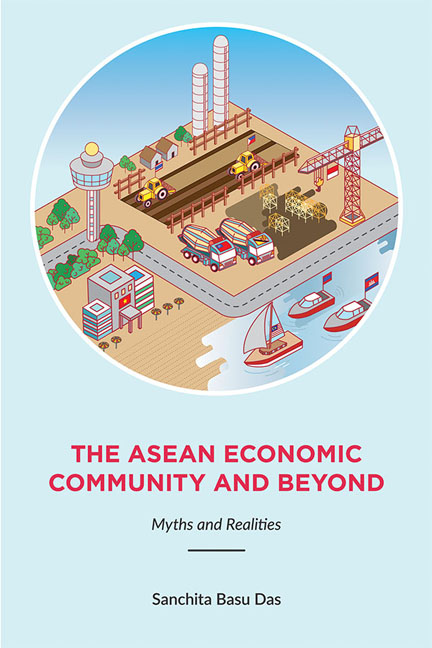Book contents
- Frontmatter
- Dedication
- Contents
- Foreword
- Acknowledgements
- Abbreviations
- 1 Introduction: The ASEAN Economic Community and Beyond
- I THE ASEAN ECONOMIC COMMUNITY (AEC)
- II BEYOND THE ASEAN ECONOMIC COMMUNITY
- 9 The Regional Comprehensive Economic Partnership: Going Beyond ASEAN+1 FTAs
- 10 Comparing ASEAN+1 FTAs for an Effective RCEP
- 11 Challenges in Negotiating the Regional Comprehensive Economic Partnership Agreement
- 12 The Next Decade in ASEAN-U.S. Economic Relations
- 13 RCEP and TPP: Comparisons and Concerns
- 14 The Trans-Pacific Partnership (TPP): Economic and Strategic Implications for the Asia-Pacific
- 15 The Trans-Pacific Partnership as a Tool to Contain China: Myth or Reality?
- 16 RCEP and TPP: Can They Converge into an FTAAP?
- 17 Is APEC's Relevance Fading?
- III AN ASEAN PERSPECTIVE OF REGIONAL CONNECTIVITY
- Appendix: Summary of the Trans-pacific Partnership Agreement
- Index
- About the Author
11 - Challenges in Negotiating the Regional Comprehensive Economic Partnership Agreement
from II - BEYOND THE ASEAN ECONOMIC COMMUNITY
Published online by Cambridge University Press: 19 May 2017
- Frontmatter
- Dedication
- Contents
- Foreword
- Acknowledgements
- Abbreviations
- 1 Introduction: The ASEAN Economic Community and Beyond
- I THE ASEAN ECONOMIC COMMUNITY (AEC)
- II BEYOND THE ASEAN ECONOMIC COMMUNITY
- 9 The Regional Comprehensive Economic Partnership: Going Beyond ASEAN+1 FTAs
- 10 Comparing ASEAN+1 FTAs for an Effective RCEP
- 11 Challenges in Negotiating the Regional Comprehensive Economic Partnership Agreement
- 12 The Next Decade in ASEAN-U.S. Economic Relations
- 13 RCEP and TPP: Comparisons and Concerns
- 14 The Trans-Pacific Partnership (TPP): Economic and Strategic Implications for the Asia-Pacific
- 15 The Trans-Pacific Partnership as a Tool to Contain China: Myth or Reality?
- 16 RCEP and TPP: Can They Converge into an FTAAP?
- 17 Is APEC's Relevance Fading?
- III AN ASEAN PERSPECTIVE OF REGIONAL CONNECTIVITY
- Appendix: Summary of the Trans-pacific Partnership Agreement
- Index
- About the Author
Summary
The Regional Comprehensive Economic Partnership (RCEP) is an ambitious initiative to enhance economic integration and cooperation amongst the ten ASEAN member states and the group's Free Trade Agreement (FTA) partners of Australia, China, India, Japan, South Korea and New Zealand. If successfully concluded, RCEP as a grouping has the potential to generate a GDP of US$26.2 trillion (representing 32 per cent of global GDP) by 2015. However, RCEP negotiations are not without challenges. These include managing different relational dynamics among its sixteen members; historical conflicts and unsettled territorial disputes between China, Japan and Korea; significant development gaps among RCEP members that may prevent countries from pursuing aggressive trade liberalization policies; lack of commonality across ASEAN+1 FTAs and varying domestic policies; the lack of domestic support; and concurrent regional integration agendas which could put pressure on a country's scarce resources of personnel and budget. Despite the challenges, the ongoing RCEP negotiations showcase the member countries’ interest to deepen economic integration. With RCEP around, ASEAN will benefit from pursuing its “open regionalism” policy, addressing the “noodle bowl” effect of ASEAN+1 FTAs, and harnessing its role in developing a wider Asia-Pacific regional architecture.
INTRODUCTION
The Regional Comprehensive Economic Partnership (RCEP) is an ambitious initiative to enhance economic integration and cooperation amongst the ten ASEAN member states and the group's Free Trade Agreement (FTA) partners of Australia, China, India, Japan, South Korea and New Zealand. If successfully concluded, RCEP as a grouping has the potential to generate a GDP of US$26.2 trillion (representing 32 per cent of global GDP) by 2015. It would also create the world's largest trading bloc and have major implications for Asian countries and the world economy as a whole. In particular, the partnership is expected be a powerful vehicle for widening global production networks and reducing the inefficiencies of heterogeneous Asian trade agreements.
Negotiations among the sixteen parties began in early 2013 and are scheduled to conclude by the end of 2015. Led by Indonesia, negotiations are based on principles aimed at achieving a comprehensive trade agreement among members. The core of the negotiating agenda covers trade in goods and services, investment, economic and technical cooperation and dispute settlement. It aims for significant improvements over the existing ASEAN+1 FTAs and is expected to give due consideration to the different levels of development among the members.
- Type
- Chapter
- Information
- The ASEAN Economic Community and BeyondMyths and Realities, pp. 116 - 124Publisher: ISEAS–Yusof Ishak InstitutePrint publication year: 2015

